
Alfredo James Pacino is an American actor. Considered one of the greatest and most influential actors of the 20th century, Pacino has received numerous accolades: including an Academy Award, two Tony Awards, and two Primetime Emmy Awards achieving the Triple Crown of Acting. He also received four Golden Globe Awards, a BAFTA, two Screen Actors Guild Awards and been honored with the Cecil B. DeMille Award in 2001, the AFI Life Achievement Award in 2007, the National Medal of Arts in 2011, and the Kennedy Center Honors in 2016.

Who's Harry Crumb? is a 1989 American comedy-mystery film featuring John Candy as the title character. Paul Flaherty directed the film, which co-stars Annie Potts, Jeffrey Jones and Shawnee Smith. An uncredited cameo appearance is made by Jim Belushi. The story concerns the often incompetent, sometimes brilliant, private investigator Harry Crumb, who searches for a kidnapping victim.

Ellen Rona Barkin is an American actress. Her breakthrough role was in the 1982 film Diner, and in the following years, she had starring roles in films such as Tender Mercies (1983), Eddie and the Cruisers (1983), The Adventures of Buckaroo Banzai Across the 8th Dimension (1984), The Big Easy (1986), Johnny Handsome, and Sea of Love.
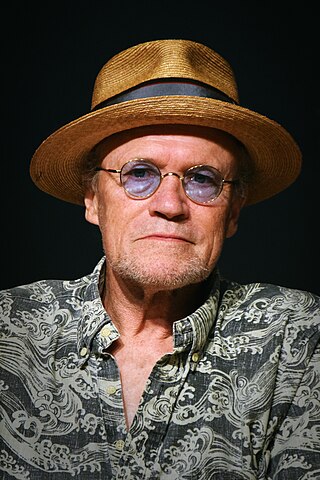
Michael Rooker is an American actor who first rose to prominence for portraying Henry in Henry: Portrait of a Serial Killer (1986). Rooker is best known for starring as Merle Dixon in the AMC series The Walking Dead (2010–2013) and as Yondu Udonta in Guardians of the Galaxy (2014), followed by its sequels Guardians of the Galaxy Vol. 2 (2017) and Guardians of the Galaxy Vol. 3 (2023). He is a recurring collaborator of Guardians of the Galaxy director and co-CEO of DC studios James Gunn, appearing in his films Slither (2006), Super (2010) and The Suicide Squad (2021).
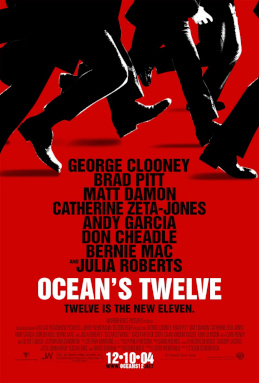
Ocean's Twelve is a 2004 American heist comedy film directed by Steven Soderbergh and written by George Nolfi. The second installment in the Ocean's film trilogy franchise and the sequel to Ocean's Eleven (2001), the film features an ensemble cast including George Clooney, Brad Pitt, Matt Damon, Catherine Zeta-Jones, Andy García, Don Cheadle, Bernie Mac, Julia Roberts, Casey Affleck, Scott Caan, Vincent Cassel, Eddie Jemison, Carl Reiner, and Elliott Gould.
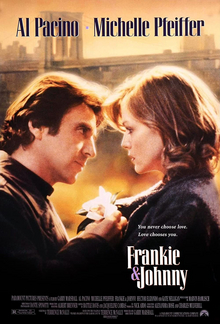
Frankie and Johnny is a 1991 American romantic drama film directed by Garry Marshall and starring Al Pacino and Michelle Pfeiffer in their first film together since Scarface (1983). Héctor Elizondo, Nathan Lane, and Kate Nelligan appear in supporting roles. The original score was composed by Marvin Hamlisch.

Cordelia Caroline Sherman, known professionally as Delia Sherman, is an American fantasy writer and editor. Her novel The Porcelain Dove won the Mythopoeic Fantasy Award.

Cruising is a 1980 crime thriller film written and directed by William Friedkin and starring Al Pacino, Paul Sorvino, and Karen Allen. It is loosely based on the novel of the same name by The New York Times reporter Gerald Walker about a serial killer targeting gay men, particularly those men associated with the leather scene in the late 1970s. The title is a double entendre, because "cruising" can describe both police officers on patrol and men who are cruising for sex.
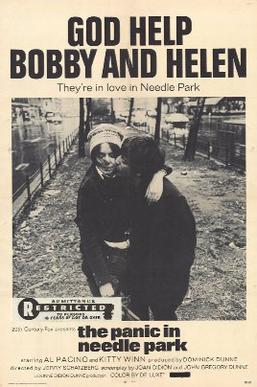
The Panic in Needle Park is a 1971 American drama film directed by Jerry Schatzberg and starring Al Pacino and Kitty Winn. The screenplay was written by Joan Didion and John Gregory Dunne, adapted from the 1966 novel by James Mills.
Extremities is an off-Broadway play by William Mastrosimone and directed by Robert Allan Ackerman. It opened at the Westside Theatre in New York on December 22, 1982 and ran for 325 performances.
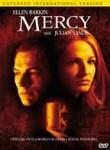
Mercy is a 2000 erotic thriller film directed by Damian Harris and starring Ellen Barkin. The movie was based on a novel written by David L. Lindsey.

"Sea of Love" is a song written by John Philip Baptiste and George Khoury. It was the only top-40 chart-maker for Phillips, who never recorded another hit.
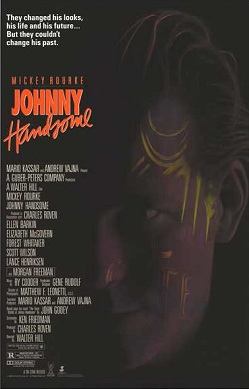
Johnny Handsome is a 1989 American neo-noir crime thriller film directed by Walter Hill and starring Mickey Rourke, Ellen Barkin, Forest Whitaker and Morgan Freeman. The film was written by Ken Friedman, and adapted from the novel The Three Worlds of Johnny Handsome by John Godey. The music for the film was written, produced and performed by Ry Cooder, with four songs by Jim Keltner.
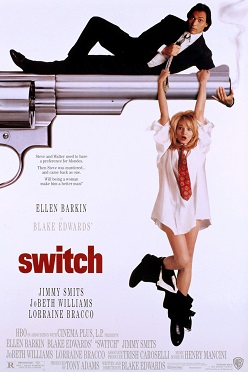
Switch is a 1991 American fantasy comedy film written and directed by Blake Edwards. Based on George Axelrod's 1959 play Goodbye Charlie, the film stars Ellen Barkin, Jimmy Smits, JoBeth Williams, and Lorraine Bracco.

No Small Affair is a 1984 American comedy-drama film directed by Jerry Schatzberg and starring Jon Cryer and Demi Moore. Cryer, Jennifer Tilly, Tim Robbins and Tate Donovan make their film debuts.
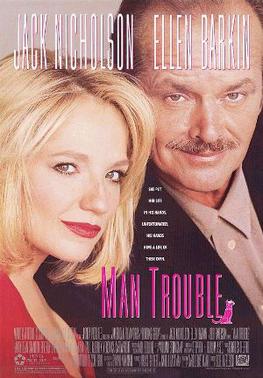
Man Trouble is a 1992 American romantic black comedy film starring Jack Nicholson and Ellen Barkin. It was directed by Bob Rafelson and written by Carole Eastman, who together had been responsible for 1970's Five Easy Pieces.
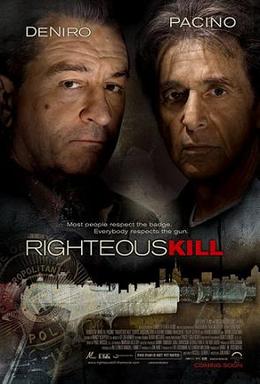
Righteous Kill is a 2008 American crime thriller film directed by Jon Avnet and written by Russell Gewirtz. The film stars Robert De Niro and Al Pacino as New York City Police Department detectives on the hunt for a serial killer. It is the third film in which both De Niro and Pacino appear in starring roles, and also stars John Leguizamo, Carla Gugino, Donnie Wahlberg, Brian Dennehy, and Curtis Jackson.

Cop Hater is a 1958 American crime film noir police procedural film based on the 1956 novel Cop Hater written by Ed McBain, the first in a series of books about the 87th Precinct in New York City. The film was produced and directed by William Berke, written by Henry Kane and stars Robert Loggia and Gerald O'Loughlin.

Sex and the Single Girl is a 1964 American Technicolor comedy film directed by Richard Quine and starring Tony Curtis, Natalie Wood, Henry Fonda, Lauren Bacall and Mel Ferrer.
The Return of the World's Greatest Detective is a 1976 American made-for-television mystery comedy film starring Larry Hagman as an inept motorcycle cop named Sherman Holmes, who, after sustaining a head injury, became convinced that he was actually Sherlock Holmes and as a result of his injury acquired formidable powers of observation and deduction. Dean Hargrove and Roland Kibbee wrote the film's story directly for television, intending it to be a pilot for a series that would have been titled Alias Sherlock Holmes. The film originally aired on NBC on June 16, 1976.


















